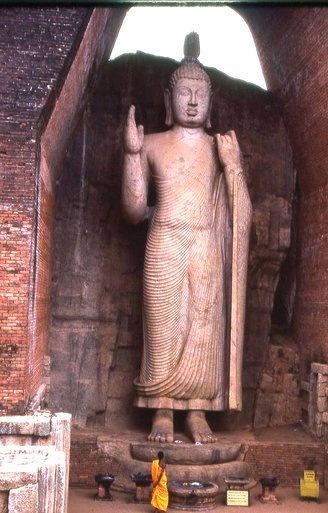I pretty much assume that pain goes with the territory of living. We’re wired to notice life’s problems more than life’s gifts, for the obvious evolutionary reason that, while positive strokes may be very much appreciated, a few negative hits can kill us—and could certainly kill our ancestors back when our huge brains were evolving. It makes sense for us to be primed to take great notice of any potential threats to our existence.
The reason I care about this is that I often hear meditation being promoted as a path to happiness, even though the mythical Buddha is supposed to have promised the less ambitious hope of merely (!) ending suffering. Now I think it’s fair to say that if meditation really was the royal road to happiness, Buddhism wouldn’t be confined here in the USA to the tiny half-a-percent of folks who identify with it. If meditation reliably alleviated suffering and unhappiness, everyone would be doing it.
But it doesn’t and they’re not. Meditation doesn’t bring on-going happiness, any more than dieting brings thinness. Just as most diets ignore the body’s innate desire for more fats and sugars, meditation can do nothing to relieve our desire for more happiness. To extend the analogy, when someone tries a diet, they’ll typically watch their weight yo-yo a couple of times until they’re back to about where they started, and decide that the diet just doesn’t work. Similarly, someone who tries meditation in the hope of achieving some degree of happiness and — finding that, darn, it’s the same old me with the same old shit — might be forgiven for concluding that meditation doesn’t work.

“I’m enlightened and you’re not.” (Barry Evans)
Of course, meditation isn’t the drug-free version of Prozac. It’s not some gizmo to add to our current arsenal of happiness tools — binge TV, on-line dating, endorphins-through-exercise, sex, drugs and rock ‘n’ roll. Meditation is a refuge for some, an adventure for others, but it’s really not about improving our inner lives. Perhaps it’s about noticing and seeing how absurd are our attempts to fix and improve our psyches — even as we wonder who the heck is doing the noticing — but it’s not the answer to anything. Sometimes it’s not even the question.
Perhaps it’s worth asking what we mean when we talk about happiness. Three types of happiness come to mind:
* Ecstasy: This moment, here and now, it doesn’t get any better!
* Happiness just for today: dammit, one scoop of ice-cream isn’t going to hurt — in fact just anticipating it makes me happy!
* Long-term life happiness: I’ll skip dessert and run 30 minutes so I’ll be happy and healthy in my old age. (I suspect many meditators might admit to the hope that their non-always-joyful practice will bring long-term life-happiness.)
I don’t think there’s a whole lot we can do to actually achieve happiness, today or fifty years on. I suspect that the ancient Greeks knew more about the subject than all the “how to attain happiness” guru-authors whose books grace several shelves at my local bookstores. Back then, you didn’t work, or meditate, or diet, or exercise, to be happy. When happiness came your way, you accepted it as a gift from the gods, and shrugged when they withheld their bounty (read the Iliad if you don’t believe me). Once you’d said the right prayers and sacrificed to the right gods, happiness was pretty much a matter of luck. We can still see that notion in English, where happenstance, haphazard and hapless are cognate, deriving from hap, chance or fortune.
Looking back on my life, I see several reasons why my efforts to attain happiness fail:
* The very yearning for happiness brings unhappiness, reminding me of my dissatisfaction!
* Even if I set up my daily life to work towards future ‘life’ happiness (what philosopher Daniel Gilbert calls, “treat[ing] our future selves as though they were our children, spending most of the hours of most of our days constructing tomorrows that we hope will make them happy”), ain’t gonna happen that way, guaranteed. What I think now will bring happiness in the future may be quite different from what I’ll want when that future arrives.
* Happiness is self-limiting. The very awareness of being happy leads to a variety of messages, all of which I notice take the edge off it: “Yeah I’m happy, but I think I should be happier” or, “The first time I did this, I was a lot happier than I am now” or, “I’m happy now, but for how long?” or, “I should have done this sooner” …and on and on. I can’t be aware of my happiness without commentary and (usually) critical judgment.
Like meditation, the non-pursuit of happiness is a lot easier to write about than to do. I guess I’ve spent most of my life thinking that I could somehow create happiness. And I certainly believed that my spiritual practice (for want of a better phrase), especially meditation, would lead to greater happiness. Once I accepted that there really wasn’t much I could do to be happy, life pretty much started taking care of itself.
Sometimes I’m even happy. I think.
CLICK TO MANAGE